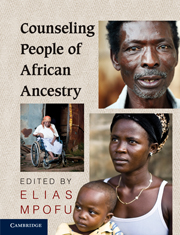Book contents
- Frontmatter
- Contents
- Contributors
- About the Editor
- Editorial Board
- Foreword
- Preface
- Acknowledgments
- PART 1 FOUNDATIONS OF COUNSELING IN AFRICAN SETTINGS
- PART 2 CONTEXTS OF COUNSELING
- 7 School Counseling
- 8 Counseling Students at Tertiary Institutions
- 9 Family Therapy within the African Context
- 10 Pastoral Care and Counseling
- 11 African Refugees: Challenges and Prospects of Resettlement Programs
- 12 Counseling Orphans and Vulnerable Children in Africa
- 13 Diversity Counseling with African Americans
- 14 Resolving Conflict in Africa: In Search of Sustainable Peace
- PART 3 COUNSELING APPLICATIONS
- PART 4 THE FUTURE OF COUNSELING IN AFRICAN HERITAGE SETTINGS
- Counseling People of African Ancestry Multiple Choice Answers
- Index
9 - Family Therapy within the African Context
Published online by Cambridge University Press: 05 August 2011
- Frontmatter
- Contents
- Contributors
- About the Editor
- Editorial Board
- Foreword
- Preface
- Acknowledgments
- PART 1 FOUNDATIONS OF COUNSELING IN AFRICAN SETTINGS
- PART 2 CONTEXTS OF COUNSELING
- 7 School Counseling
- 8 Counseling Students at Tertiary Institutions
- 9 Family Therapy within the African Context
- 10 Pastoral Care and Counseling
- 11 African Refugees: Challenges and Prospects of Resettlement Programs
- 12 Counseling Orphans and Vulnerable Children in Africa
- 13 Diversity Counseling with African Americans
- 14 Resolving Conflict in Africa: In Search of Sustainable Peace
- PART 3 COUNSELING APPLICATIONS
- PART 4 THE FUTURE OF COUNSELING IN AFRICAN HERITAGE SETTINGS
- Counseling People of African Ancestry Multiple Choice Answers
- Index
Summary
OVERVIEW. Family relationships play a pivotal role in the mental and physical well-being of individuals and hence require a healthy balance of connection as well as individuation. The historical, social, and therapeutic foundations of family counseling have emerged from research and practice based in the Euro-American context, and thus extrapolating these models to other contexts, such as the African one, may omit the importance of the unique interactions families have with major environmental systems. In this chapter, we consider the social and psychological factors that differentiate clients of African ancestry; the history, research, and practice of family counseling; the utility of traditional therapeutic modalities; and current practices, legal and professional issues, research on counseling, within the African context.
LEARNING OBJECTIVES
By the end of the chapter, the reader should be able to:
Define the social and psychological factors that differentiate families of African ancestry from European and American families.
Understand the first- and second-order cybernetic techniques used in the counseling of families.
Discuss the importance of an ethically based practice.
Appreciate the operational difficulties inherent in using the nuclear family as the foundational basis for the conceptualization of family therapy.
Understand the impact of globalization on family wellbeing.
Evaluate prospective areas of research that would advance our understanding of the family dynamics within an African context.
- Type
- Chapter
- Information
- Counseling People of African Ancestry , pp. 142 - 154Publisher: Cambridge University PressPrint publication year: 2011
- 9
- Cited by

